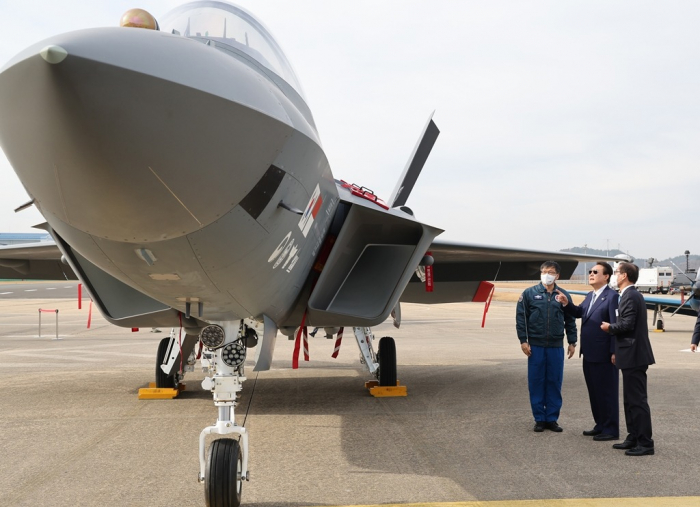Aerospace & Defense
S.Korea to spur defense sector tech with $1.5 bn R&D investment
The government will develop the defense industry with a combination of future technologies
By Feb 23, 2023 (Gmt+09:00)
2
Min read
Most Read
LG Chem to sell water filter business to Glenwood PE for $692 million


Kyobo Life poised to buy Japan’s SBI Group-owned savings bank


KT&G eyes overseas M&A after rejecting activist fund's offer


StockX in merger talks with Naver’s online reseller Kream


Mirae Asset to be named Korea Post’s core real estate fund operator



South Korea plans to accelerate growth in the defense industry, a future growth engine of Asia’s fourth-largest economy, by investing more than 2 trillion won ($1.5 billion) in joint research and development in areas between the military and private sectors.
The Presidential Advisory Council on Science & Technology chaired by President Yoon Suk-yeol on Wednesday determined to spend the money over the next five years to support the development of 88 technologies in 16 sectors including artificial intelligence, robots, next-generation satellites, unmanned aerial vehicles (UAVs) and others.
“The council prepared the plan to actively expand defense R&D centered on future high technologies and extend the basis of the industry’s competitiveness from the army, navy and air force to the private aerospace sectors,” said an official of the Ministry of Science and ICT. The ministry manages sub-committees of the presidential organization.
The defense sector won $17.3 billion won in orders from other countries last year, emerging as a core industry in the trade-dependent economy.
FUTURE TECHNOLOGY FOR DEFENSE
South Korea aims to develop technologies for operating groups of ground robots and drones, as well as fuel cells and secondary batteries for use in extreme environments. The government also plans to establish a comprehensive system to strike back at UAVs as it failed to thwart North Korean surveillance drones that have crossed the demarcation line into South Korean airspace with one of them making its way into Seoul in December of last year.
The country is set to accelerate the development of space technologies including those for low-cost rockets with rapid launch functions and interorbital mobile spacecraft – which are directly related to the future defense industry – while seeking to make its own components for satellites. The country decided to gradually transfer the solid-fuel space projectile technology of the Agency for Defense Development to private companies including startups this year.
Government bodies such as the Ministry of National Defense, the Ministry of Trade, Industry and Energy, as well as the Defense Acquisition Program Administration, will prepare measures including a 200 billion won investment plan to produce about 40 core parts by its own efforts for the defense sectors such ultra-high-strength carbon composite materials for autonomous aerial vehicles (AAVs).
In addition, the country will spend 50 billion won on training some 3,000 experts, especially mechanical and aerospace software developers with master’s and doctoral degrees.
Write to Hae-Sung Lee at lhs@hankyung.com
Jongwoo Cheon edited this article.
More to Read
-
 Aerospace & DefenseS.Korea to lure global talent with high pay for space agency
Aerospace & DefenseS.Korea to lure global talent with high pay for space agencyFeb 16, 2023 (Gmt+09:00)
2 Min read -
 Aerospace & DefenseK-defense sector to reach annual export of $16 bn for two consecutive years
Aerospace & DefenseK-defense sector to reach annual export of $16 bn for two consecutive yearsJan 04, 2023 (Gmt+09:00)
2 Min read
Comment 0
LOG IN


